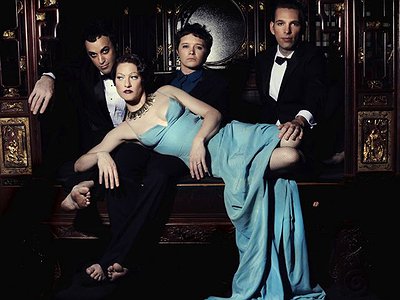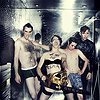When did you start writing/producing music - and what or who were your early passions and influences?
I was twelve when I wrote my first song. I was influenced by everything around me, every sound I heard on the radio and every human voice. My early passion was eating.
What do you personally consider to be the incisive moments in your artistic work and/or career?
Definitely the moment I woke up this morning. IT WAS AN ARTISTIC TRIUMPH.
What are currently your main compositional- and production-challenges?
I don't have any! Everything is perfect! I have decided to defeat all potential problems and stumbling blocks by playing the ukulele and never committing anything to the universal archive.
What do you usually start with when working on a new piece?
I usually start with the beginning. But sometimes I’ll add a little introduction to the beginning, so that the beginning becomes the middle.
How strictly do you separate improvising and composing?
Barely at all. I don't think I’ve ever played a song the same way twice. I think that comes from learning by ear. I’ve never been able to read music so, to me; songs are just chord changes and loose patterns.
How do you see the relationship between sound, space and composition?
I think they're doing okay but honestly, I’m a little worried that sound and space aren't doing so well...as you probably know, they're in an open thing, but sound called me a few days ago and told me that composition called her and said that space hasn't talked to her in like two weeks because they got drunk at that Belgian festival and wound up sleeping together and they decided that not telling sound would be the best plan, which was obviously a huge mistake, right? And now that sound is back from a long tour in Japan, all hell has broken loose, and on top of that, composition has decided to spend the next year celibate. It’s a complicated relationship.
Do you feel it important that an audience is able to deduct the processes and ideas behind a work purely on the basis of the music? If so, how do you make them transparent?
I think this is a totally different choice for every artist. Saying it is important to anyone but me would be dictating something I have no desire to dictate.
I think it is important for the audience to have their own experience. Some artists choose to expose and rip open and blare transparency. Some feel it is important to hide the process behind a cement wall. Both are correct.
In how much, do you feel, are creative decisions shaped by cultural differences – and in how much, vice versa, is the perception of sound influenced by cultural differences?
I think everything affects everything else all the time.
The relationship between music and other forms of art – painting, video art and cinema most importantly - has become increasingly important. How do you see this relationship yourself and in how far, do you feel, does music relate to other senses than hearing alone?



